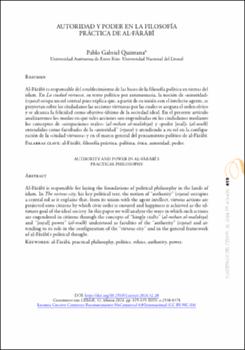Autoridad y poder en la filosofía práctica de al-Fārābī
Autor
Quintana, Pablo GabrielFecha
2024Resumen
Al-Fārābī es responsable del establecimiento de las bases de la filosofía política en tierras del
islam. En La ciudad virtuosa, su texto político por antonomasia, la noción de «autoridad»
(riyasa) ocupa un rol central pues explica que, a partir de su unión con el intelecto agente, se
proyectan sobre los ciudadanos las acciones virtuosas por las cuales se asegura el orden cívico
y se alcanza la felicidad como objetivo último de la sociedad ideal. En el presente artículo
analizaremos los modos en que tales acciones son engendradas en los ciudadanos mediante
los conceptos de «ocupaciones reales» (al-mihan al-malakiya) y «poder [real]» (al-mulk)
entendidos como facultades de la «autoridad” (riyasa) y atendiendo a su rol en la configu-
ración de la «ciudad virtuosa» y en el marco general del pensamiento político de al-Fārābī. Al-Fārābī is responsible for laying the foundations of political philosophy in the lands of
islam. In The virtous city, his key political text, the notion of “authority” (riyasa) occupies
a central rol as it explains that, from its union with the agent intellect, virtous actions are
projected onto citizens by which civic order is ensured and happiness is achieved as the ul-
timate goal of the ideal society. In this paper we will analyze the ways in which such actions
are engendered in citizens through the concepts of “kingly crafts” (al-mihan al-malakiya)
and “[royal] power” (al-mulk) understood as faculties of the “authority” (riyasa) and at-
tending to its role in the configuration of the “virtous city” and in the general framework
of al-Fārābī’s political thought.





